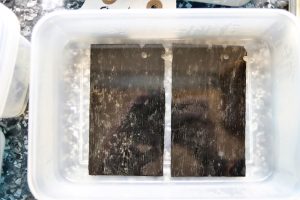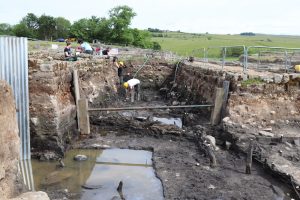A cache of writing tablets, dating to 1st cent. AD, containing secret letters were discovered buried in the ground near the ancient Roman fort of Vindolanda, Northumberland, United Kingdom.

The cache contained faded wafer-thin slices of wood, which were written on with ink. The artefacts were in a very good state of preservation thanks to the anaerobic conditions in which they were buried. According to the archaeologists some of the tablets are so well preserved that they can be read without the usual infrared photography and before going through the long conservation process. The artefacts were discovered within an archaeological layer immediately above the ancient pre-Roman farmers field, at the bottom of a steep-sided and narrow trench which was prone to flooding. They were scattered in a line between 3-4 metres long and trapped in a layer of dirt and organic waste that had been dumped by the Roman army to build up the foundations for a new building inside a fort. The researchers believe the letters were likely discarded after being read, along with other rubbish.

The Roman fort of Vindolanda stood just south of Hadrian’s Wall, the construction of which was started by Emperor Hadrian in 122 AD. First postcard-size strips of wood covered with ink-written messages were discovered in 1970s. So far archaeologists recorded over 400 named characters who paint a picture of a community of Tungrians (Belgians), Batavians (Dutch), Vardulli (Spanish) and other nationalities from all social strata, from commanders to slaves. The cache of documents provides an unprecedented look at life in a Roman garrison. Along with beer requests, birthday invitations and letters that included derogatory names for the locals, the tablet collection includes the oldest example of women’s handwriting from Europe, in the correspondence between two high-ranking military commanders’ wives.

In the newest cache of tablets, a man called Masculus, asks for a leave, or “commeatus” in Latin. In a past correspondence he is recorded writing to the Commander, Falvius Cerialis asking that he send beer for the men as he could not “answer for them” if they did not receive it.
(after The Vindolanda Trust, Live Science, ITV & Current Archaeology)